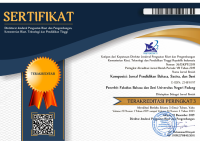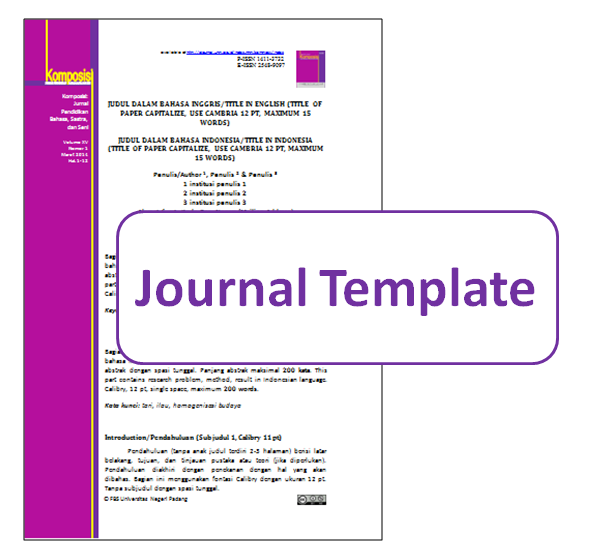Optimization of Media Literacy Learning through Artificial Intelligence Recommendation System
Abstract
The use of technology in the digital era has transformed the way we interact with media, emphasizing the importance of media literacy in understanding and navigating information effectively. However, media literacy education faces challenges, including the rapid evolution of the media and the prevalence of misinformation. The aim of this research is to measure the effectiveness of media literacy learning through AI recommendation systems among students of the Indonesian Language and Literature Education Study Program, Unika Santu Paulus Ruteng. This study employed a quasi-experimental method with pre-test and post-test designs to evaluate the effectiveness of using artificial intelligence recommendation systems in improving students' media literacy. The research sample consisted of 2021-level students, with Class 2021A as the experimental group and Class 2021B as the control group. Data collection was conducted through descriptive and writing tests. Data analysis utilized correlation tests to examine the relationship between variables and T-tests to compare pre-test and post-test scores between the two groups. The results indicate that the class using AI recommendation systems experienced a significant improvement in media literacy skills compared to the control group. Data analysis also showed an increase in score homogeneity, confirming the effectiveness of the intervention in making learning more equitable. The implications of these findings suggest that integrating AI recommendation.
Keywords
Full Text:
PDF (Bahasa Indonesia)References
Anderson, J., & Rainie, L. (2018). Artificial Intelligence and the Future of Humans | Pew Research Center. In Pew Research Center.
Ary, D., Jacobs, L. C., Sorensen, C., & Razavieh, A. (2016). Introduction to Research in Education 8th Edition. In Revista Brasileira de Linguística Aplicada (Vol. 5, Issue 1).
Biemans, H. J., Mulder, M., Wesselink, R., & Gulikers, J. (2019). Towards competency-based curriculum reform: The case of an adaptive and personalized competency assessment system. Studies in Higher Education, 44(5), 817-829.
Buckingham, D. (2015). Defining digital literacy: What do young people need to know about digital media? Nordic Journal of Digital Literacy, 2015(4). https://doi.org/10.18261/issn1891-943x-2015-jubileumsnummer-03
Cook, Thomas D & Campbell, D. T. (2008). QUASI-EXPERIMENTATION: DESIGN & ANALYSIS ISSUES FOR FIELD SETTINGS. Analysis, 1979.
Creswell, J. W. (2012). Educational research: Planning, conducting, and evaluating quantitative and qualitative research. In Educational Research (Vol. 4).
Fraenkel, J. R., Wallen, N. E., & Hyun, H. H. (2012). How to Design and Evaluate Research in Education, 8th Edition (2012). In Climate Change 2013 - The Physical Science Basis (Vol. 53, Issue 9).
Gonzales, R. C., & Woods, R. E. (2019). Digital Image Processing. (Fourth Edi). Pearson.
Hobbs, R. (2010). Digital and Media Literacy : A Plan of Action written by. Communications.
Johnson, A., & Johnson, B. (2016). The impact of artificial intelligence on personalized learning. Journal of Educational Technology, 42(3), 567-582.
Johnson, C. (2019). Fake News and Media Literacy: A Critical Analysis. Educational Research Quarterly, 42(3), 345–362.
Kemendikbud. (2017). Paduan Gerakan Literasi Nasional. Kementrian Pendidikan dan Kebudayaan.
Khoerunnisa, L., & Anwar, R. K. (2019). Literasi Media Sosial Pada Ibu Rumah Tangga : Pemanfaatan Sosial Media Sosial Oleh Ibu Rumah Tangga di Karawang Barat. Journal of Information and Library Studies, 2(2).
Li, M., & Zhang, Y. (2019). Enhancing critical thinking skills through AI-powered simulations. Journal of Educational Technology, 47(4), 789-802.
Liu, B. (2010). Sentiment Analysis and Subjectivity in: Handbook of Natural Language Processing, Second Edition. Handbook of Natural Language Processing, Second Edition, 2.
Livingstone, S. (2019). Media Literacy in the Digital Age: Skills, Strategies, and Capabilities. Routledge. https://doi.org/10.18574/nyu/9781479884575.003.0002
Ramadhani, A. N., Martono, N., Puspitasari, E., & Sabrina, L. (2023). Hubungan Literasi Media dengan Persepsi Gender Siswa Sekolah Dasar. The Journal of Society and Media, 7(1). https://doi.org/10.26740/jsm.v7n1.p133-153
Ricci, F., Shapira, B., & Rokach, L. (2015). Recommender systems: Introduction and challenges. In Recommender Systems Handbook, Second Edition. https://doi.org/10.1007/978-1-4899-7637-6_1
Saepudin, E. (2023). Literasi Media Sebagai Sarana Pembelajaran Anak Usia Dini. Dharmakarya, 12(2). https://doi.org/10.24198/dharmakarya.v12i2.37432
Siemens, G., & Baker, R. S. J. D. (2012). Learning analytics and educational data mining: Towards communication and collaboration. ACM International Conference Proceeding Series. https://doi.org/10.1145/2330601.2330661
Smith, A. (2018). Media Literacy Education: A Hands On Approach. Journal of Media Education, 45(2), 87–102.
Smith, C., & Brown, E. (2018). Enhancing math performance through AI-powered virtual tutors. Journal of Educational Research, 55(2), 123-136.
Valkenburg, P. M., & Peter, J. (2013). The differential susceptibility to media effects model. Journal of Communication, 63(2). https://doi.org/10.1111/jcom.12024
Wang, L., & Chen, S. (2017). AI-powered virtual collaboration platforms in education. Journal of Interactive Learning Research, 29(1), 23-37.
Wineburg, S., & McGrew, S. (2019). Lateral reading and the nature of expertise: Reading less and learning more when evaluating digital information. Teachers College Record, 121(11). https://doi.org/10.1177/016146811912101102
Zannettou, S., Caulfield, T., Setzer, W., Sirivianos, M., Stringhini, G., & Blackburn, J. (2019). Who let the trolls out? towards understanding state-sponsored trolls. WebSci 2019 - Proceedings of the 11th ACM Conference on Web Science. https://doi.org/10.1145/3292522.3326016
Zulkarnaen, M. H. R., Susyanti, J., & Dianawati, E. (2022). Pengaruh Literasi Keuangan, Inklusi Keuangan, dan Financial Technology Terhadap Perilaku Keuangan Pada Mahasiswa Fakultas Ekonomi dan Bisnis Universitas Islam Malang (Studi Kasus Pengguna BRImo Pada Nasabah Digital Banking). E – Jurnal Riset Manajemen, 12(02).
DOI: https://doi.org/10.24036/komposisi.v25i2.129152
Refbacks
- There are currently no refbacks.
Copyright (c) 2024 Komposisi: Jurnal Pendidikan Bahasa, Sastra, dan Seni

This work is licensed under a Creative Commons Attribution-NonCommercial 4.0 International License.
Komposisi: Jurnal Pendidikan Bahasa, Sastra, dan Seni, a peer-reviewed online journal in languages, literature, and arts education.
Printed ISSN 1411-3732, Online ISSN 2548-9097.
Currently, Komposisi: Jurnal Pendidikan Bahasa, Sastra, dan Seni is indexed by:











